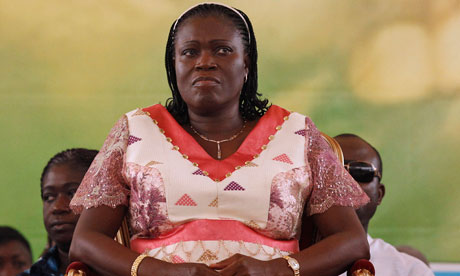Gbagbo's Iron Lady
Simone Ehivet Gbagbo, the first of the president's two wives, incites love and terror in equal measure

Simone Gbagbo, wife of Laurent Gbagbo, has a formidable reputation but claims she has been demonised by the international press. Photograph: Rebecca Blackwell/AP
Holed up in her presidential palace turned prison in the smart part of Abidjan with rebel forces closing in, Simone Ehivet Gbagbo may well be hoping for some 11th-hour divine intervention.
Since her once all-powerful husband lost the elections last year she has been fond of evoking an even higher authority to combat the man she calls the devil, French president Nicolas Sarkozy, and the bandit, her nickname for president-elect Alassane Ouattara, whose forces are laying siege to her home.
"God is on our side. God is with us," she told a delirious crowd last year. "God has already given us victory."
To supporters, Simone Ehivet, 61, the first of Gbagbo's two wives, is Maman or the "Hillary Clinton of the tropics". To opponents she is nicknamed the Iron Lady, or, less flatteringly, the Blood Lady.
She is a woman who provokes antonyms; often in the same breath described as inciting love and terror, of being a Marxist union leader and evangelical Christian, someone who intrigues or irritates, attracts or repels.
Born in 1949, Simone Ehivet was one of 17 children of a gendarme who then took a succession of wives after the death of her mother. She grew up in a conservative Catholic environment and went on to study history, oral literature and linguistics. But it was politics that fired her.
After co-founding with Laurent Gbagbo the party that was to become the Front Populaire Ivoirien (FBI) she was arrested, imprisoned and allegedly tortured for her part in the struggle for multi-party elections in her country in the 1970s.
When Gbagbo came to power in 2000 she made it no secret that he was not the only one holding the reins – appointing her own relatives and friends to government positions, getting elected as an MP and declaring herself president of the ruling FPI's parliamentary group.
"All the ministers respect me. And they often consider me above them," she told the French magazine L'Express.
When civil war broke out in 2002 she became a hardline nationalist rabble-rouser, inciting crowds with passionate rhetoric and rejecting any compromise or deals with the rebels.
When leaders of the opposite camps met for peace talks in Paris she organised a women's meeting in Abidjan and declared: "If our men are going to Paris to take decisions that don't satisfy us, they won't find us in their beds when they return."
As the talks stalled, the then UN secretary general, Kofi Annan, suggested: "Next time perhaps we should invite Madame Gbagbo," who, he ironically observed, seemed to "have a better idea of the solutions".
Afterwards she was reportedly put on a UN blacklist of people suspected of human rights abuses, including allegations that the head of her personal guard was linked to death squads.
She has twice been questioned over the 2004 disappearance of Guy-André Kieffer, a French-Canadian journalist who was in Abidjan investigating political corruption. He was last seen on his way to a meeting with Simone Ehivet's brother-in-law Michel Legré.
It has long been claimed, but never proven, that the Ivorian secret services were involved in Kieffer's disappearance – and presumed death – and that the country's first lady holds information about it, though nobody has ever suggested she was directly linked.
In 2006 the French language magazine Jeune Afrique said Simone Ehivet was "not a first lady like any other" and suggested she exercised a controversial political role in the shadows of her husband. It called her one of the "political curiosities of contemporary Africa".
Unlike many of her counterparts she is said to shun luxury hotels and prefers to buy local clothes rather than take Parisian shopping trips for jewels and designer fashions. It is often noted by African commentators that she detests cooking and anything "domestic".
"She does politics, morning to night," said Jeune Afrique.
Many have remarked on Madame Gbagbo's ability to terrify ordinary Ivorians, but she dismissed her fearsome reputation in a book, claiming she had been "demonised" by the international press. Far from being the monster they claimed, she was a shrinking violet. Few who have followed Simone Ehivet are convinced.
The French foreign minister, Alain Juppé, has accused the holed-up Laurent Gbagbo of "absurd stubbornness" in refusing to surrender.
Of his wife, the French newspaper Le Figaro remarked: "She'll be loving his obstinacy."
No comments:
Post a Comment